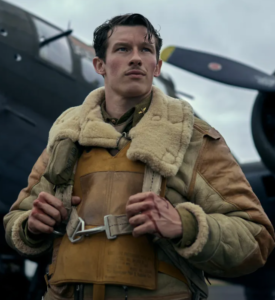
When HBO’s WWII drama Band of Brothers made its grand debut in 2001, it was an extraordinary affair. The appearance of such a lavish and grandiose mini-series on television was a rarity, if not entirely unprecedented, at that time. Unlike its counterparts on the broadcast network, Band of Brothers, masterfully produced by the esteemed duo Tom Hanks and Steven Spielberg, surpassed all expectations with its length (10 episodes) and lofty aspirations. It swiftly became a cultural phenomenon, paying homage to the traditional American concept of heroism embodied by the Greatest Generation, while fearlessly confronting the harsh realities of war. This groundbreaking series played a pivotal role in reshaping the perception of television, marking the dawn of a golden age. (It is worth noting that in 2001, iconic shows like Sex and the City and The Sopranos had only recently emerged.)
However, when the follow-up series, The Pacific, graced our screens in 2010, we had already been immersed in a decade’s worth of increasingly ambitious television productions. Consequently, The Pacific, though a commendable and intricately crafted show, appeared less remarkable in comparison. It possessed a raw brutality that overshadowed the misty-eyed sentimentality of its predecessor. Perhaps it was for this reason that The Pacific failed to capture the same fervor as Band of Brothers. This may also explain why the third installment of Spielberg and Hanks’s WWII project, a magnificent tale of bomber-pilots titled Masters of the Air, has found its home on AppleTV+ rather than HBO. The landscape of the entertainment industry has undergone significant changes over the past 23 years, and perhaps only a company as financially robust as Apple possesses the resources to fund such an ambitious and sweeping endeavor.
The spectacle is grand, spanning across vast landscapes and endless skies, as the valiant airmen of the 100th Bomb Group take to the helm of their B-17s, soaring over the war-torn European terrain, relentlessly striking at the heart of the Nazi regime. Yet, amidst this epic saga, the toll of death is staggering on Masters of the Air, leaving one disoriented in its wake. Similar to the renowned Band of Brothers, this new series endeavors to recount a sprawling narrative through the lens of two wartime comrades: the composed teetotaler Major Cleven, portrayed by the suave Austin Butler, and the audacious partygoer Major Egan, brought to life by the charismatic Callum Turner. (In this parallel, Butler assumes the mantle of the incomparable Damian Lewis, while Turner embodies the essence of Ron Livingston.) However, these protagonists often find themselves engulfed within the faceless multitude of aviators, concealed behind goggles and helmets. Created by the brilliant minds of John Shiban and John Orloff, the series proves to be a challenging endeavor to follow, particularly as characters are abruptly and frequently plucked from the narrative.
Yet, perhaps it is unjust to criticize a show that strives to depict the frightfully perilous nature of this particular facet of the war. It is, in fact, intentional that we become attached to certain characters on the ground, only to witness their untimely demise amidst the chaotic dance of high-altitude warfare, discovering later that it was their very plane that met its destruction in one of the show’s harrowing bombing sequences. The magnitude of this loss is undoubtedly felt on an intellectual level, yet Masters of the Air fails to evoke the same profound sentiment that Brothers achieved with such mastery. Instead, we find ourselves in awe of the overwhelming enormity of the entire endeavor, rather than emotionally invested in the lives of its individuals.